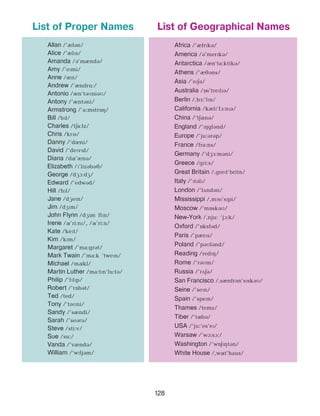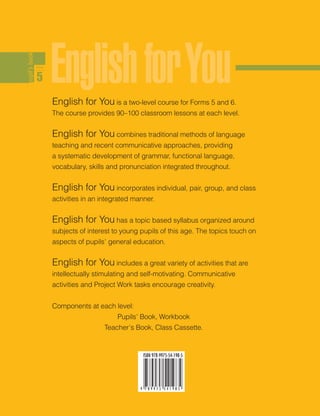Tina has recently moved to town from Bath, England. She lives with her mother, father, and younger sister. Her father is an actor who got a job at the local theatre, prompting their move. Her mother is a nurse. Tina has adjusted well to her new school and neighborhood.
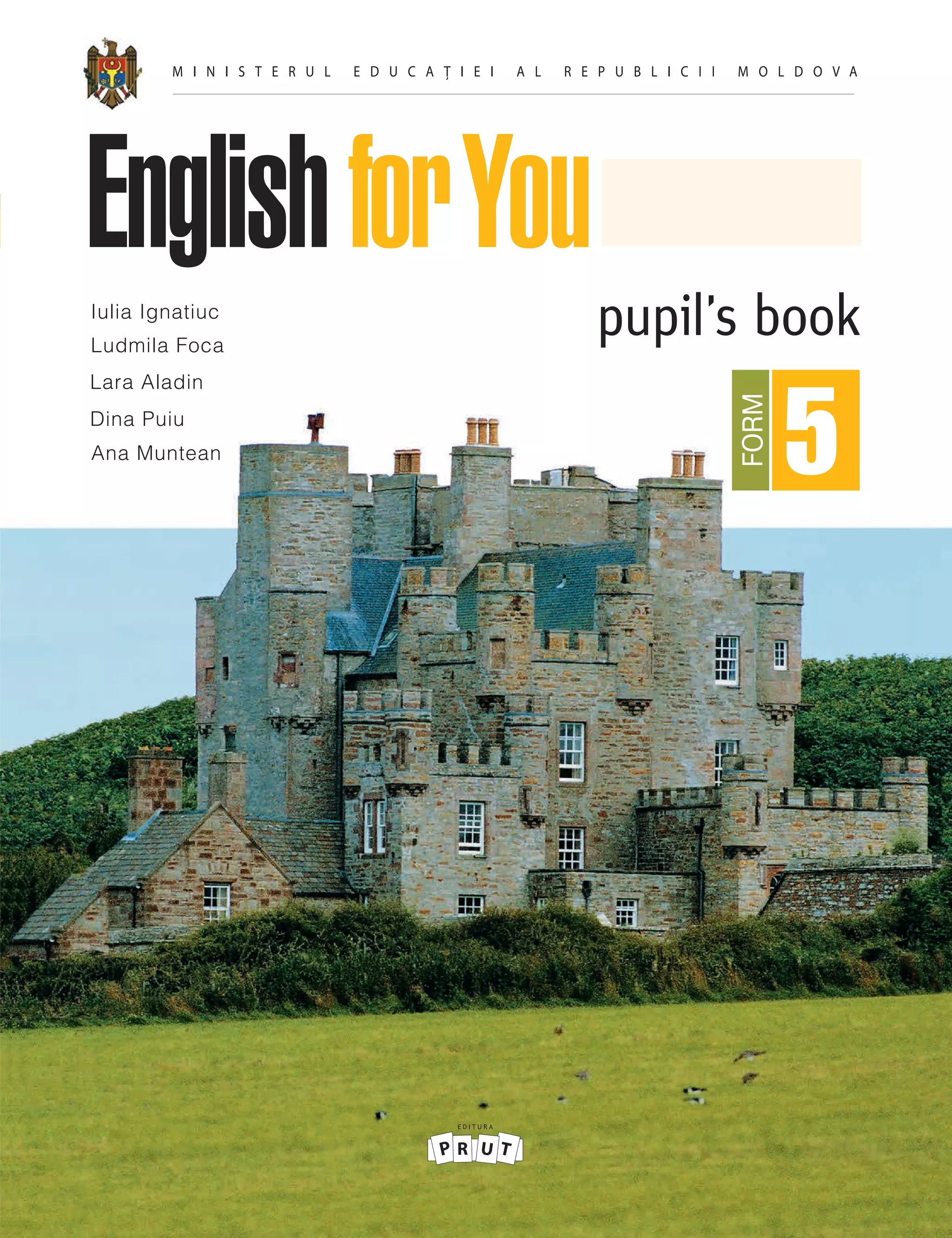
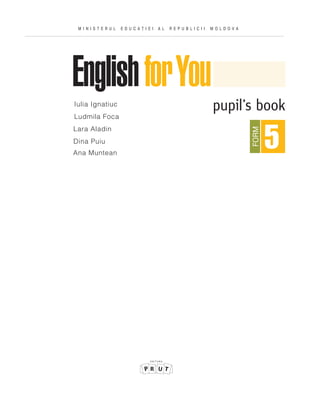
![Referent: Alexander Hollinger, conf. dr., Bucure=ti
Redactor: John Paul, BA in English, University of Boston, USA
Corector: Viorel Chiriac
Ilustraii: Svetlana Stanovschi, Corneliu Frumosu, Serghei Samsonov
Copert[: Sergiu Stanciu
Machetare computerizat[: Zoe Ciumac
© Editura Prut Internaional, 2015
© Iulia Ignatiuc, Ludmila Foca, Lara Aladin, Dina Puiu, Ana Muntean, 2015
Editura se oblig[ s[ achite dein[torilor de copyright, care ]nc[ nu au fost contactai, costurile de reproducere
a imaginilor folosite ]n prezenta ediie.
Editura Prut Internaional, str. Alba Iulia nr. 23, bl. 1A, Chi=in[u, MD 2051
Tel./fax: ( 373 22) 74 93 18; tel.: ( 373 22) 75 18 74; www.edituraprut.md; e-mail: editura@prut.ro
CZU 811.111(075.3)
E 57
Imprimat la F.E.-P. Tipografia Central[. Comanda nr. 6053
ISBN 978-9975-54-198-5
Comisia de evaluare:
Natalia Stînca, grad didactic superior, Liceul Academic de Arte Plastice „Igor Vieru”, Chi=in[u
Stela Tagadiuc, grad didactic superior, Liceul Teoretic „Constantin Stere”, Soroca
Ana Budnic, doctor ]n pedagogie, confereniar universitar, UPS „Ion Creang[”, Chi=in[u
4. Corina Ceban, grad didactic superior, Liceul Teoretic „Vasile Alecsandri”, B[li
Manualul a fost aprobat pentru reeditare prin ordinul Ministrului Educaiei al Republicii Moldova nr. 399 din 25 mai 2015.
Manualul este elaborat conform curriculumului disciplinar =i finanat din sursele Fondului Special pentru Manuale.
· Dirigintele clasei trebuie s[ controleze dac[ numele elevului este scris corect.
· Elevul nu va face nici un fel de ]nsemn[ri ]n manual.
· Aspectul manualului (la primire =i la returnare) se va aprecia: nou, bun, satisf[c[tor, nesatisf[c[tor.
Acest manual este proprietatea Ministerului Educaiei al Republicii Moldova.
+coala . . . . . . . . . . . . . . . . . . . . . . . . . . . . . . . . . . . . . . . . . . . . . . . . . . . . . . . . . . . . . . . . . . . . . . . . . . . . . . . . . . . . . . . . . . . .
Manualul nr. . . . . . . . . . . . . . . . . . . . . . . . . . . . . . . . . . . . . . . . . . . . . . . . . . . . . . . . . . . . . . . . . . . . . . . . . . . . . . . . . . . . . . . . .
Anul
de folosire
Numele
=i prenumele elevului
Anul =colar
Aspectul manualului
la primire la returnare
1.
2.
3.
4.
5.
Toate drepturile asupra acestei ediii aparin Editurii Prut Internaional.
Reproducerea integral[ sau parial[ a textului sau a ilustraiilor din acest manual este posibil[ numai cu acordul scris al editurii.](https://image.slidesharecdn.com/vlimbaengleza-171205132953/85/Limba-engleza-Manual-pentru-cl-5-3-320.jpg)
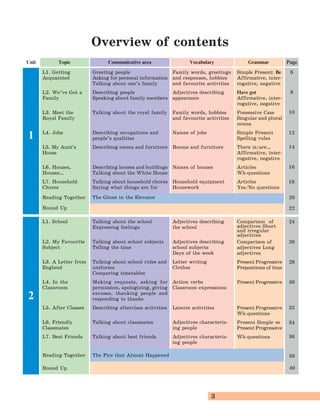
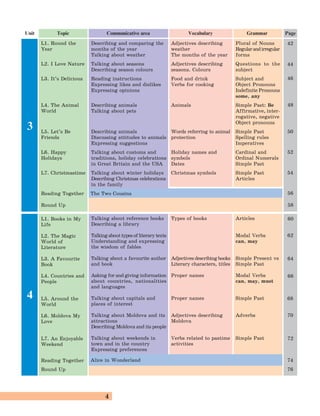
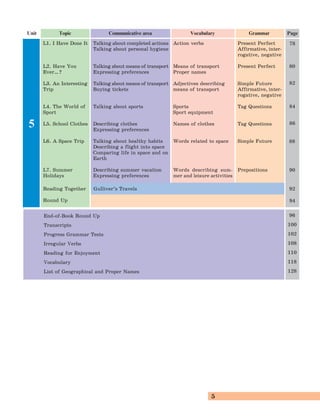
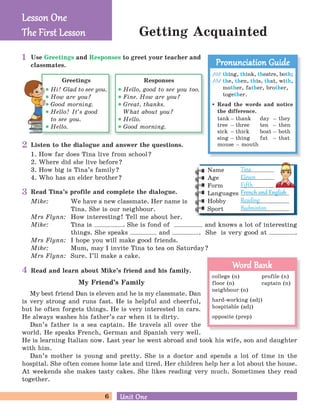
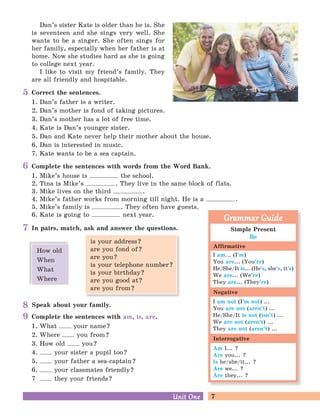
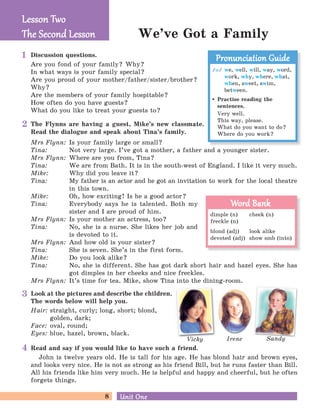
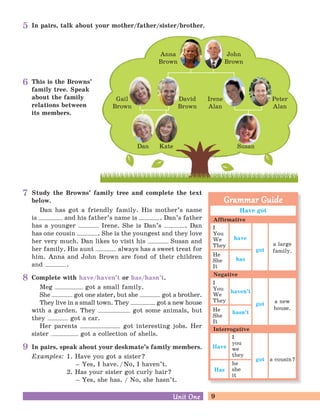
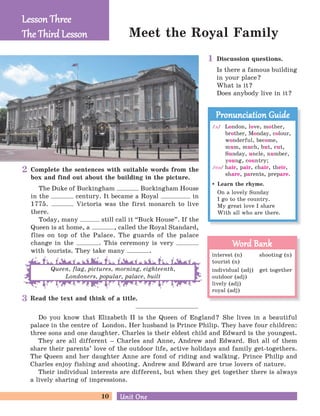
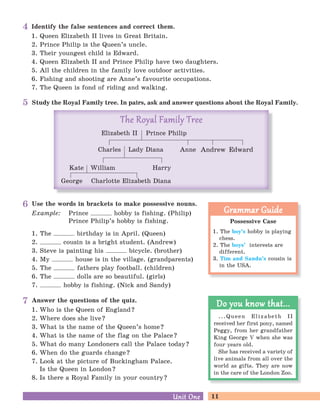
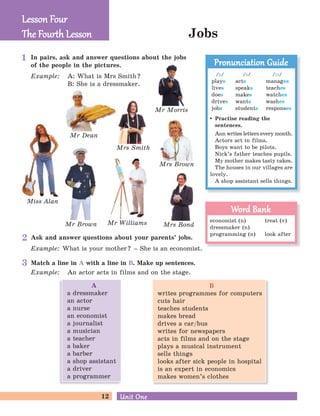
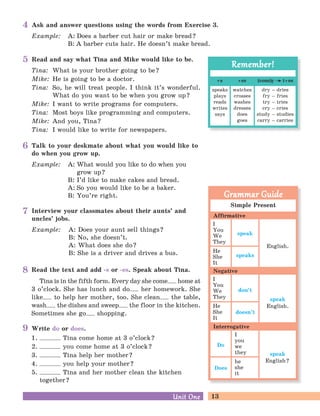
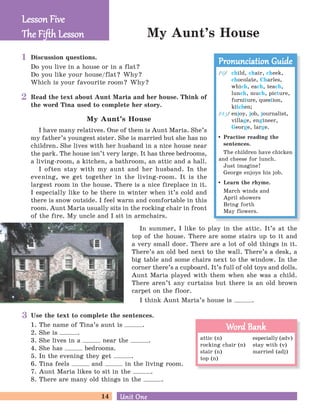
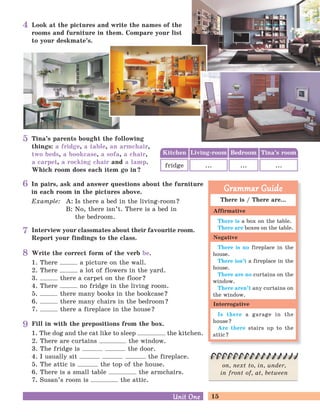
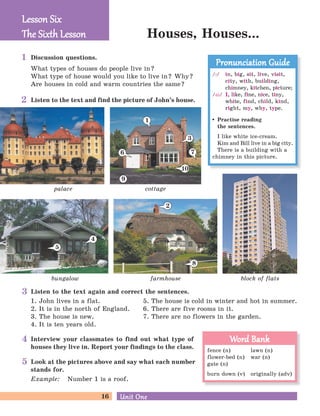
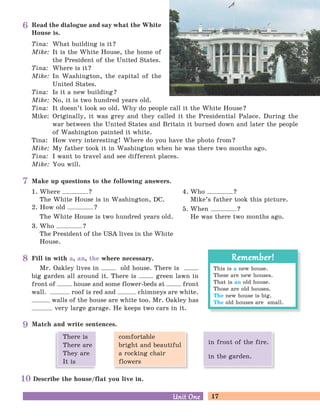
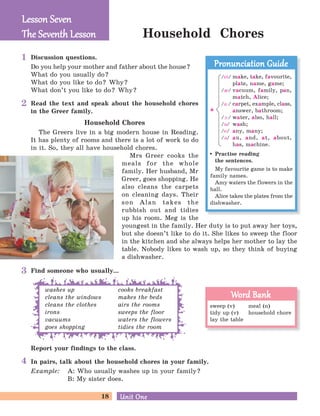
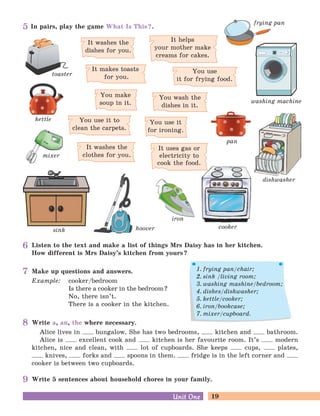
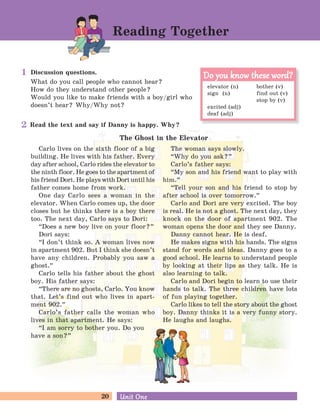
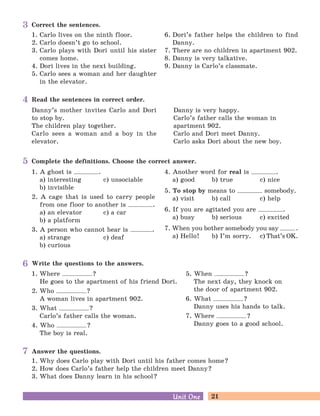
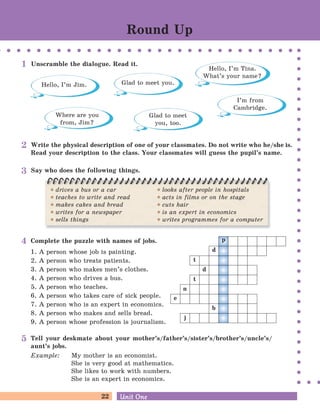
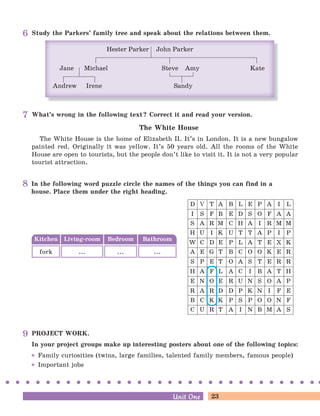
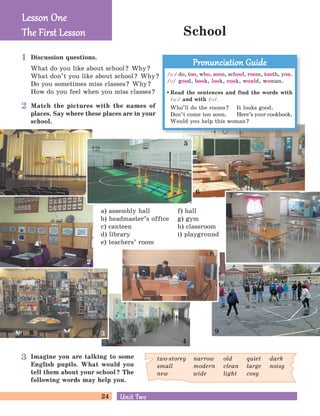
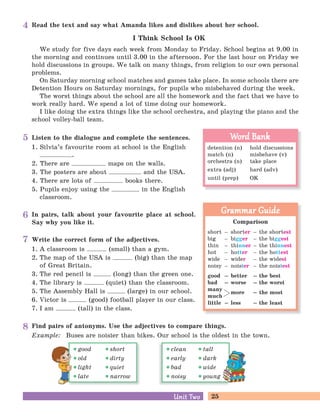
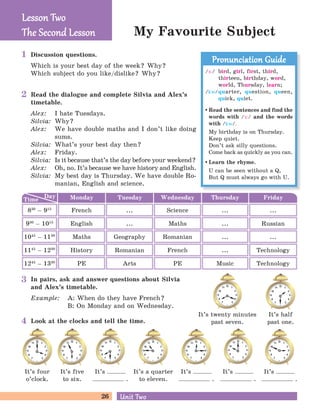
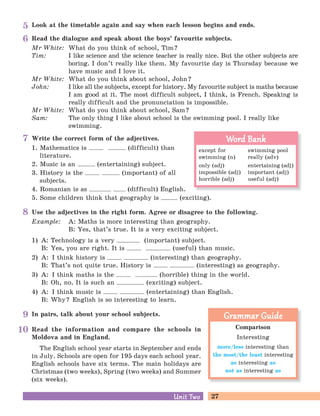
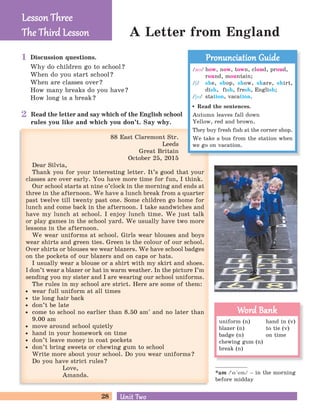
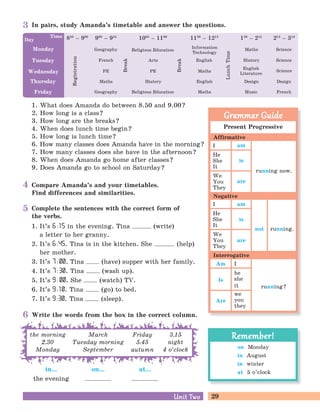
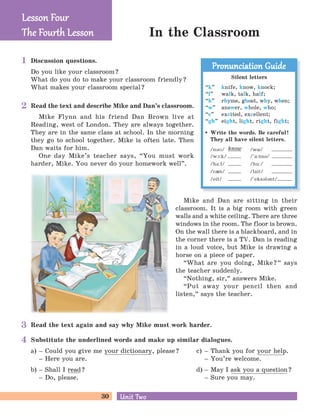
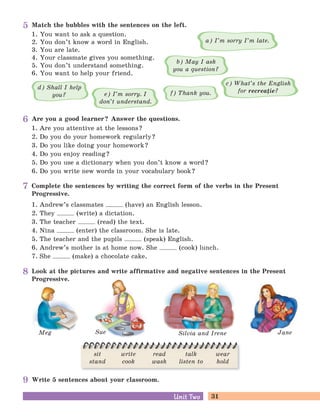
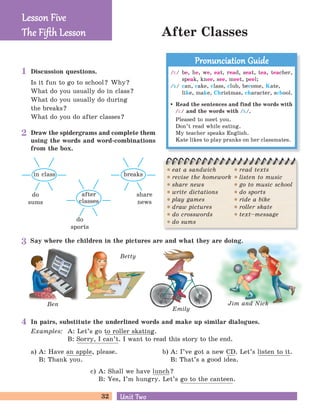
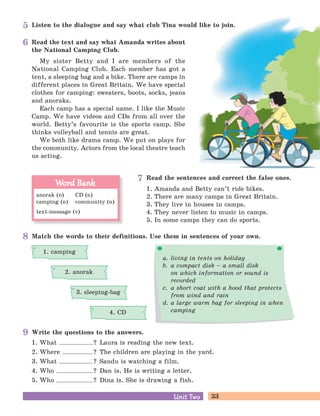
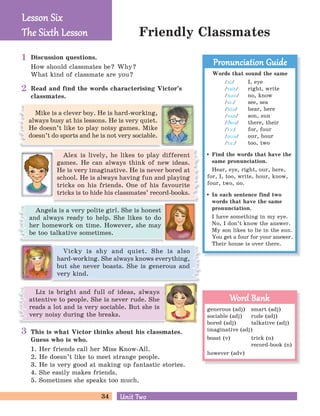
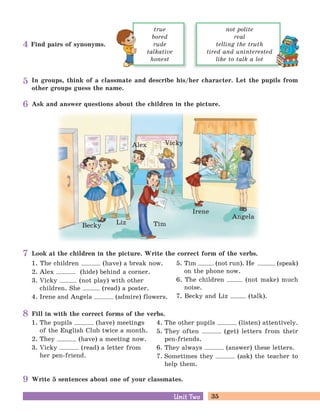
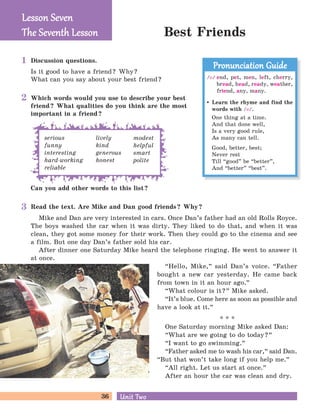
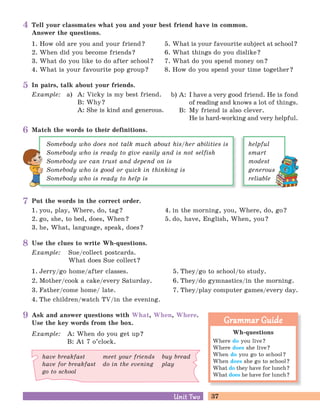
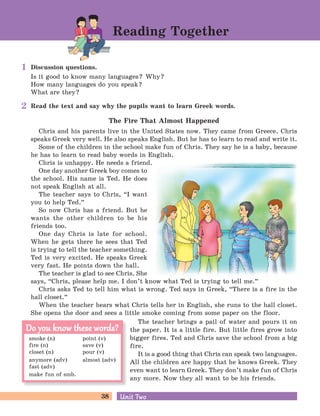
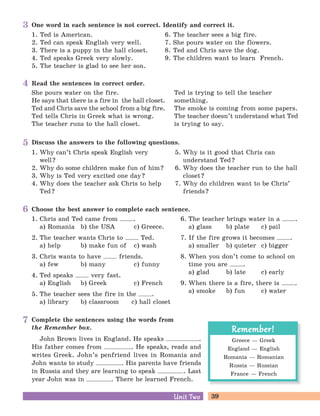
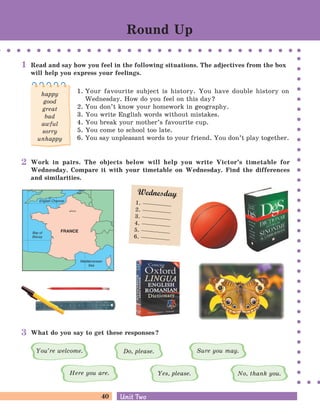
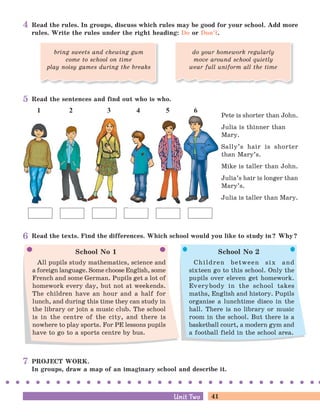
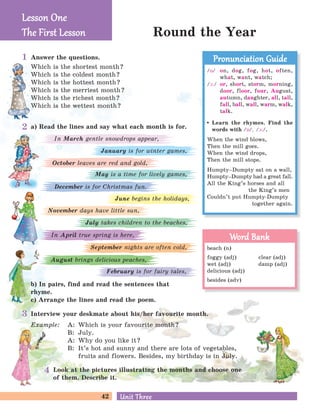
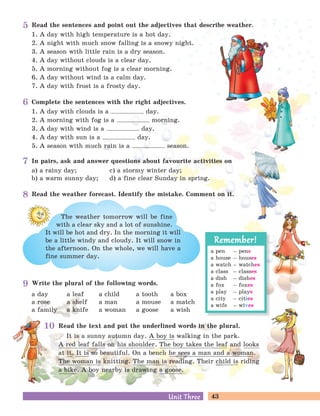
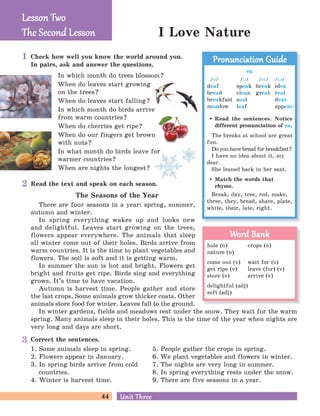
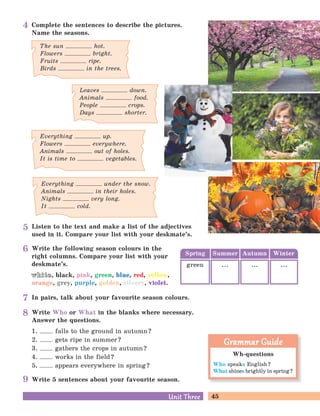
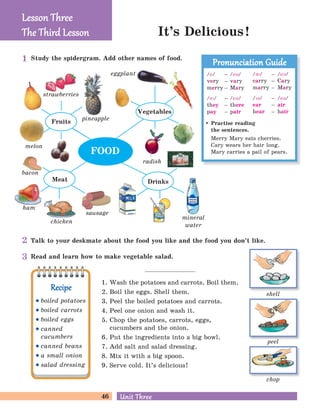
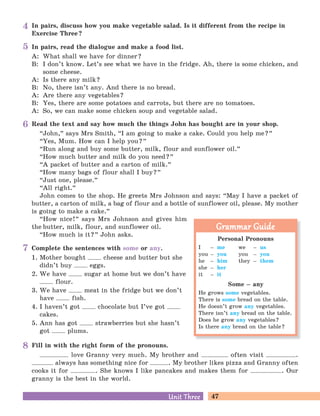
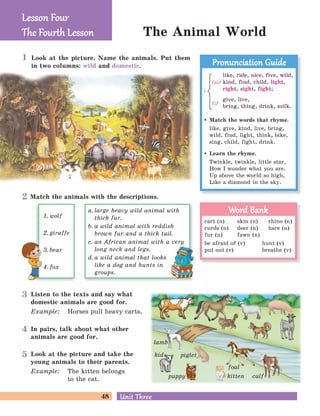
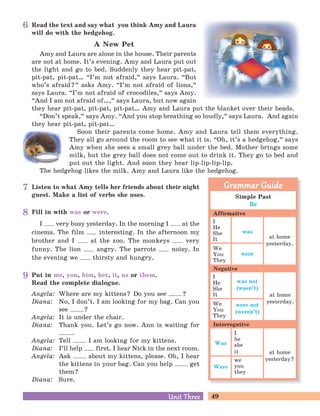
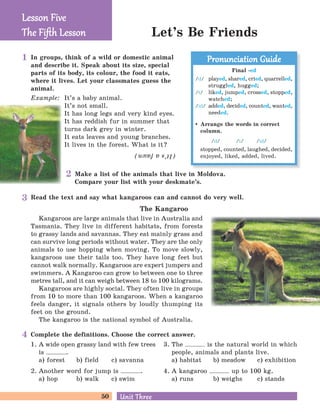
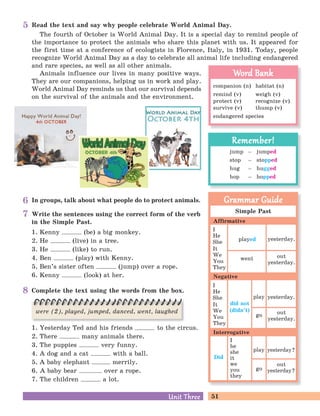
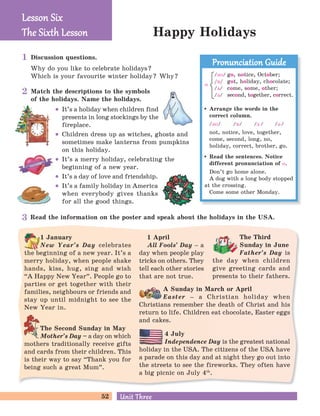
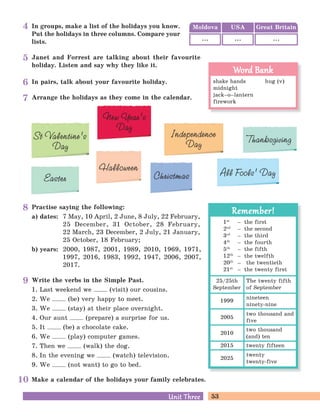
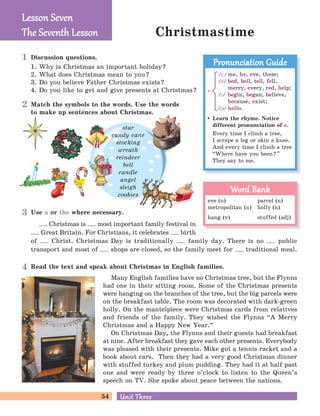
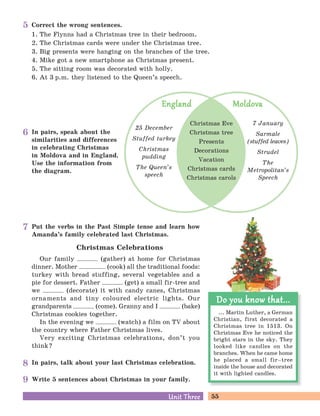
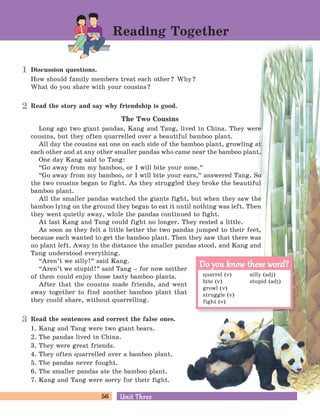
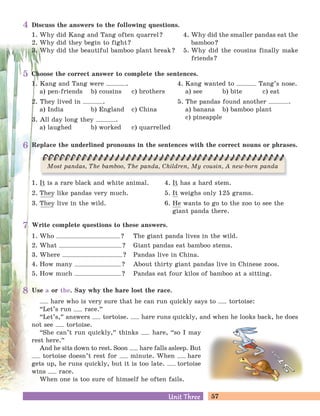
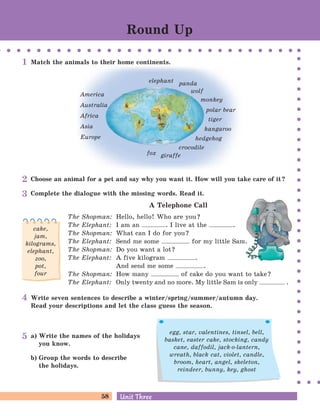
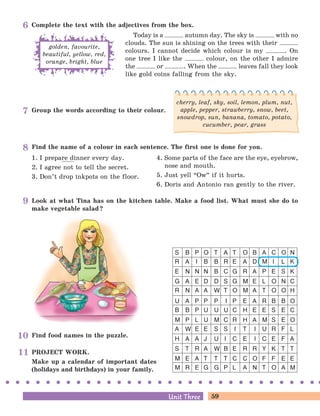
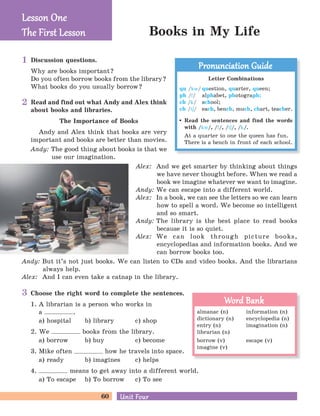
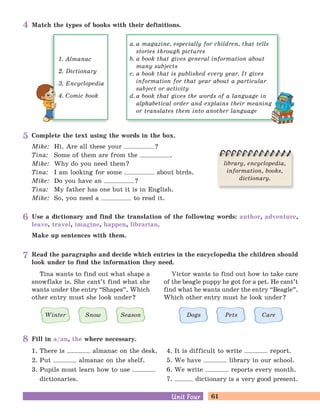
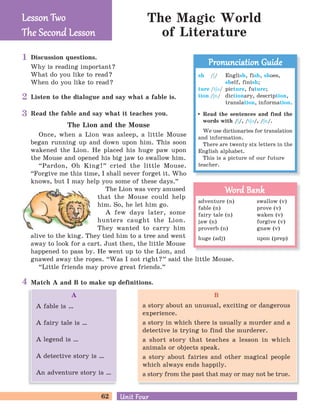
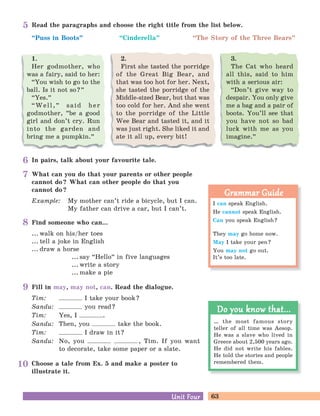
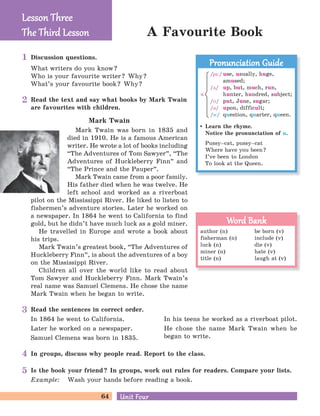
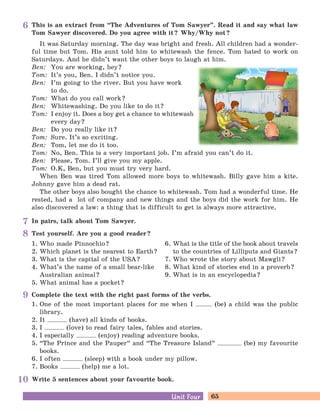
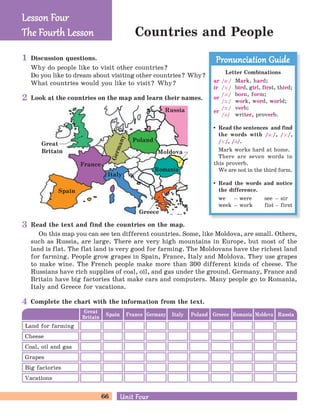
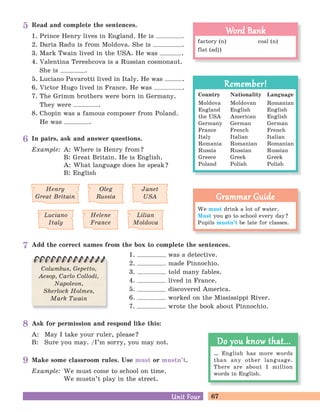
![68 Unit FourUnit Four
Around the World
London is about
twenty centuries old.
It is situated on the
river Thames. The
city was founded by
the Romans.
Rome is more than
twenty-seven centuries
old. It is situated on the
Tiber River. It stands on
seven hills.
Paris is more than twenty
centuries old. It is situated on
the river Seine. It is majestic
at any time, in every season.
Bucure=ti is more than five
centuries old. It is situated on
the river D`mbovia. It draws
its name from an ancient
shepherd named Bucur.
Chi=in[u is about six
centuries old. It is situated
on the river B]c. It stands
on seven hills.
Read the paragraphs and speak about the capitals.
In pairs, ask and answer the questions.
1. Which capital is the oldest?
2. Which capital is the youngest?
3. Which capitals are older than Moscow?
4. Is Chi=in[u older or younger than Bucure=ti?
5. What do all capitals have in common?
6. Which city would you like to visit? Why?
Moscow is about ten
centuries old. It is situated
on the Moskva River. Iuri
Dolgoruki founded the city.
Lesson FiveLesson Five
The Fiſth LessonThe Fiſth Lesson
Silent letters
“g
„
gnaw, gnome;
“b
„
doubt, lamb, climb, comb;
“t
„
listen, Christmas, mustn’t;
“w
„
write, wreath, wrong;
“h
„
shepherd, honour.
Write the words. Be careful.
They all have silent letters.
/daMt/
/kBMm/
/mDsnt/
/raPt/
/´grInpa:/
Pronunciation GuidePronunciation Guide
shepherd (n) be situated (v)
found (v)
majestic (adj)
ancient (adj)
Word BankWord Bank
Washington is
only two centuries
old. It is situated
on the Potomac
River. It is the
first carefully
planned capital in
the world.
1
2](https://image.slidesharecdn.com/vlimbaengleza-171205132953/85/Limba-engleza-Manual-pentru-cl-5-69-320.jpg)
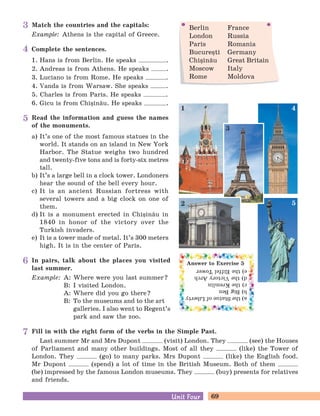
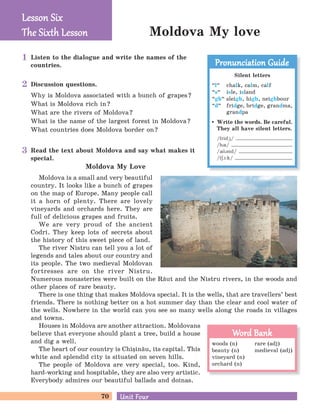
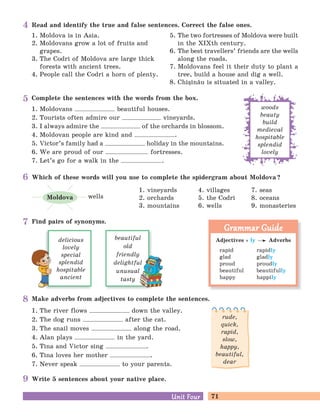
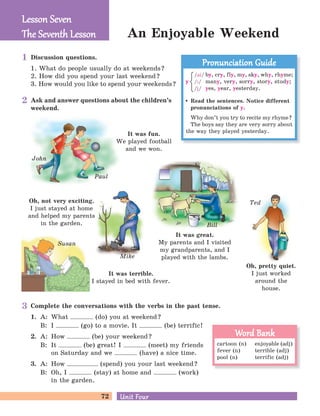
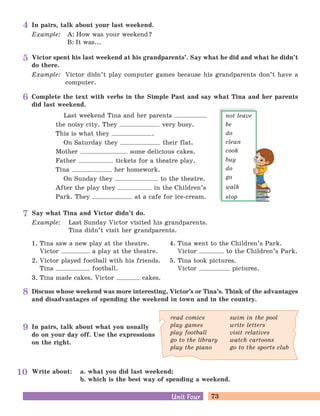
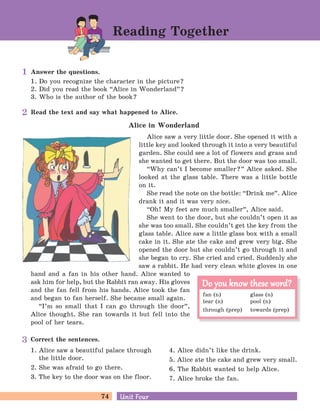
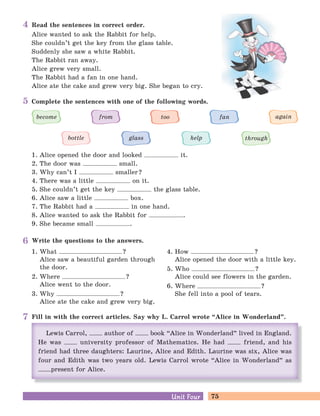
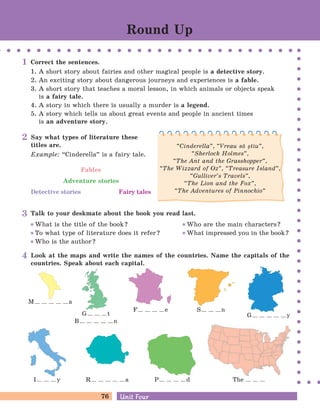
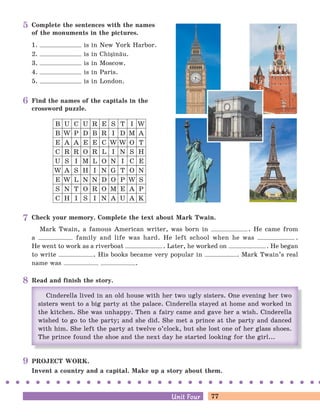
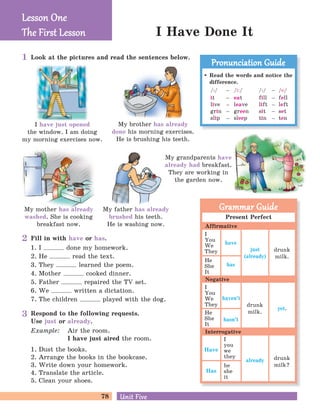
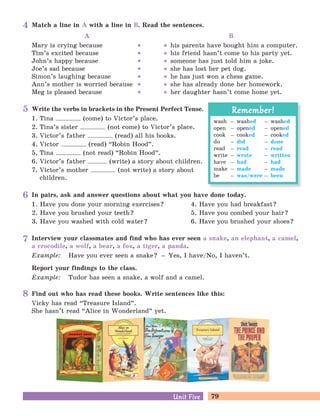
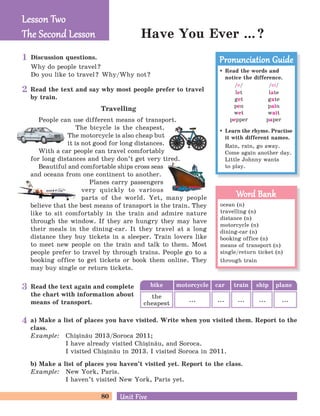
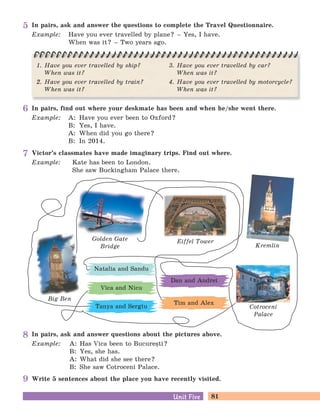
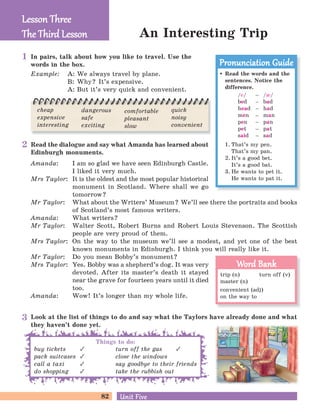
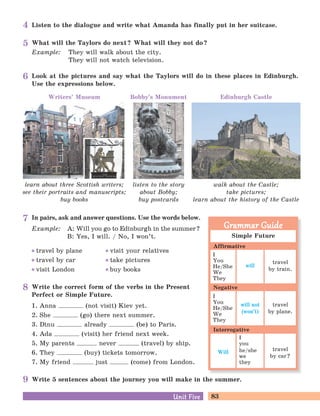
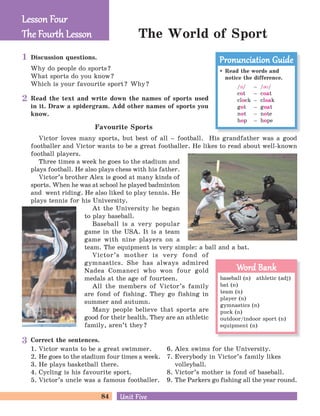
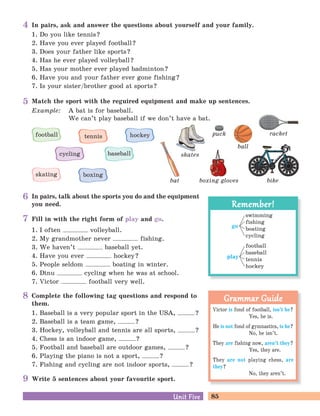
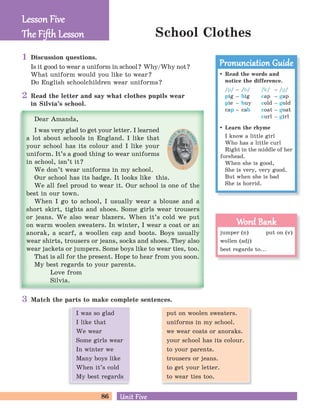
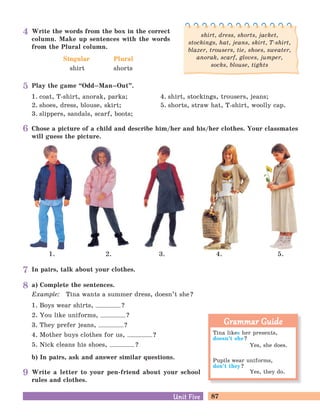
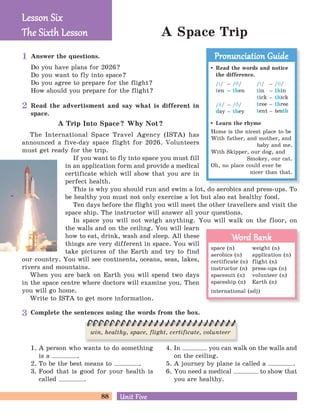
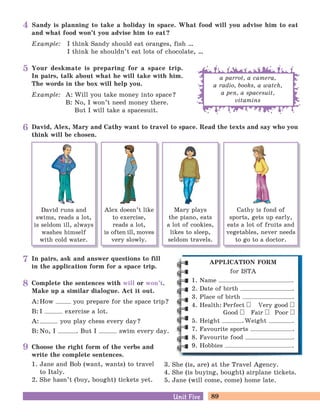
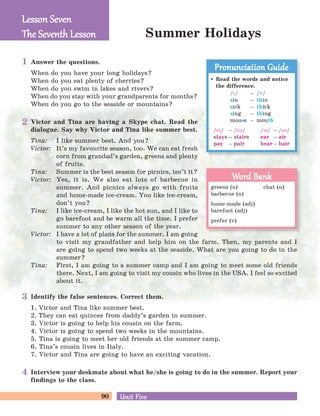
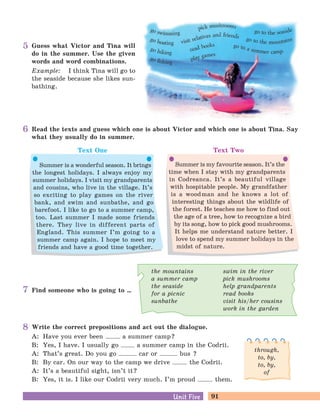
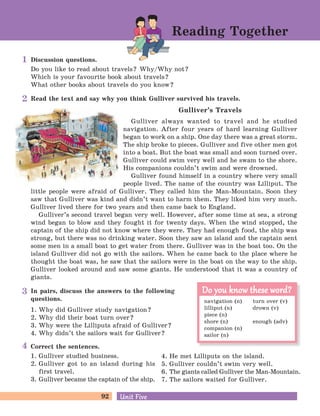
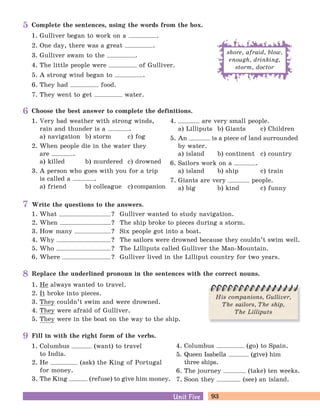
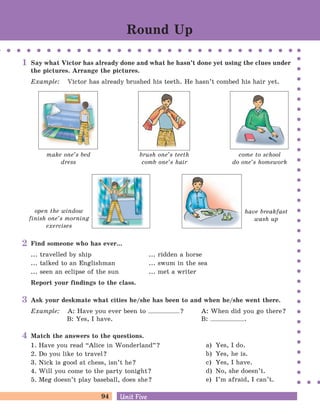
![95Unit FiveUnit Five
Curchi monastery
Soroca Fortress
Orheiul Vechi
+tefan cel
Mare’s oak
in Cob]lnea
Saharna waterfalls
Ask your deskmate if he/she has been to the places in the picture.5
Read the questionnaire. What’s your score? Compare your results with your deskmate’s.
What’s your score?a – 5, b – 3, c – 1
Total: 16–25 You are very active. You’lltravel a lot in your life.6–15 You’ll have some interestingtrips. Don’t miss your chance.1–6 You’re not very active. Youhave to think about your future.
6
Choose the right answer to complete the sentences.
1. English children wear in their schools.
a) uniforms b) bathing suits c) space suits
2. We wear in winter.
a) T-shirts b) anoraks c) shorts
3. To be the best means to .
a) be healthy b) win c) lose
4. Food that is good for us is
called .
a) healthy b) tasty c) hard
5. Many children prefer summer to
any other .
a) month b) season c) day
7
PROJECT WORK.
Make a poster about the place you live in.
8](https://image.slidesharecdn.com/vlimbaengleza-171205132953/85/Limba-engleza-Manual-pentru-cl-5-96-320.jpg)
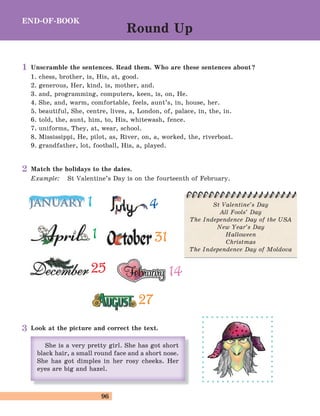
![97
Read and complete the crossword.
Across
1. Without shoes on the feet.
4. Children make it out of sand.
5. You gather them in the forest.
7. A land along the side of a river.
8. A small red round fruit with
a stone inside.
10. A large wild animal that runs
fast and has large branching horns.
11. An occasion when food is eaten
outdoors especially in the country.
Down
2. A man who works in a wood.
3. Food cooked over an open fire.
6. To lie in the sun.
9. A place where children can stay
during the summer.
Do you know the answers to the following questions.
1
4
5
10
11
7
8
2
3 9
6
1. Where does Queen Elizabeth live?
2. What are the Queen’s pets?
3. Where does the Statue of Liberty stand?
4. What is the capital of Italy?
5. Where is the river D]mbovia?
6. How old is the city of Washington?
7. Who visited the country of Lilliputs?
8. Who is the most famous story-teller of all times?
9. What are the traditional colours of the Halloween?
10. Who wrote “The Prince and the Pauper
„
?
11. Who was the first man to fly into space?
12. What did Alice use to grow smaller?
13. What was the original colour of the White House?
14. What animal is the symbol of Australia?
15. How old was Queen Elizabeth II when she received
her first pony?
16. What do we call a goat’s baby?
17. What is the favourite sport in the USA?
18. What river flows through Chi=in[u?
19. Who was the first man to decorate a fir tree?
20. How many words are there in the English language?
4
5](https://image.slidesharecdn.com/vlimbaengleza-171205132953/85/Limba-engleza-Manual-pentru-cl-5-98-320.jpg)
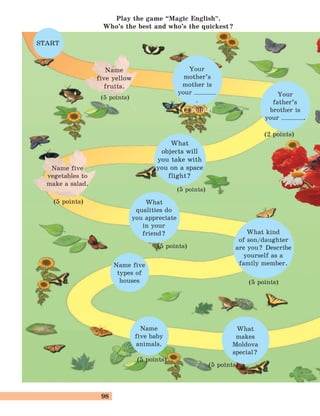
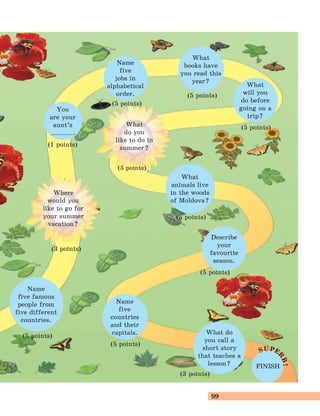
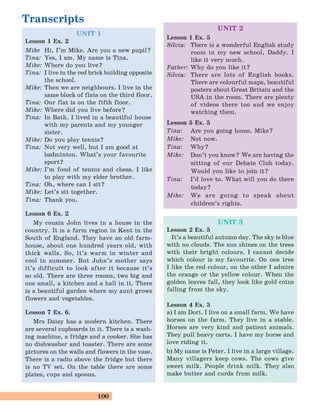
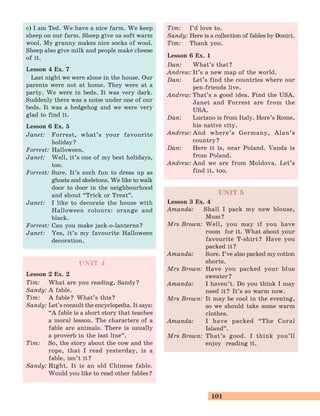
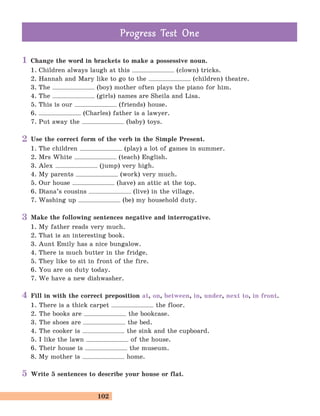
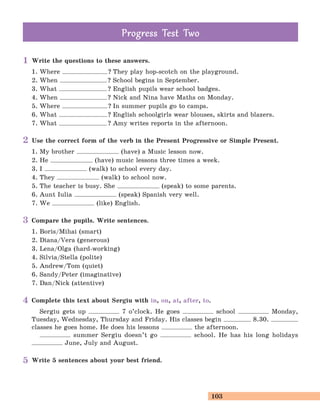
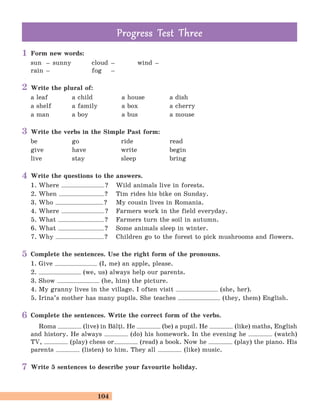
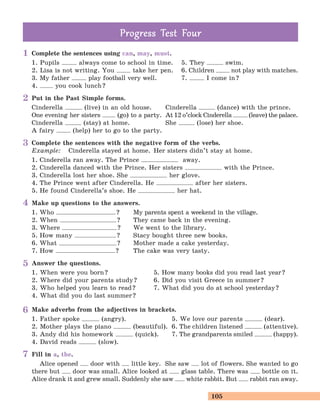
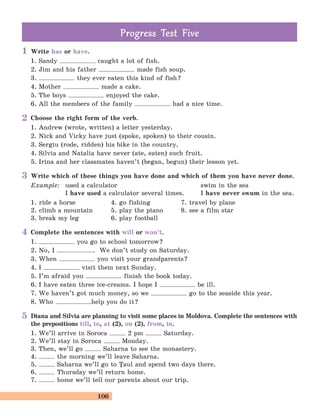
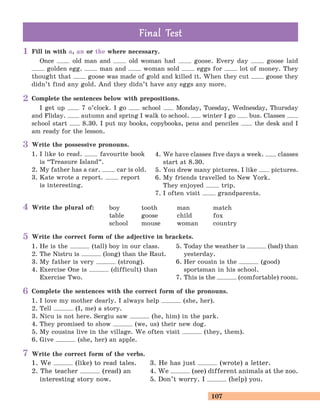
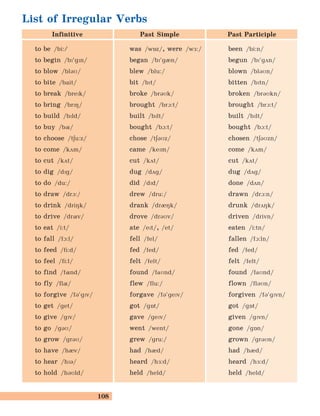
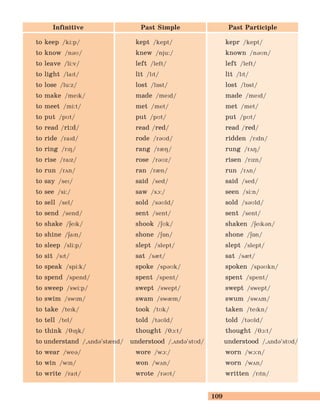
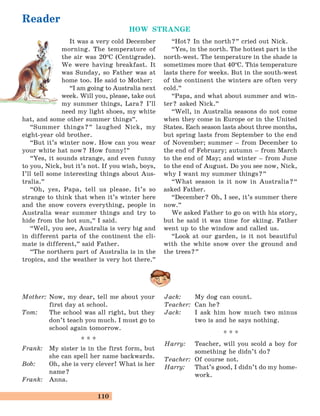
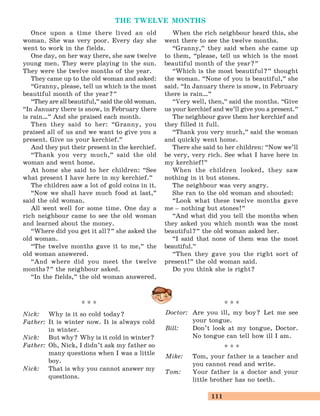
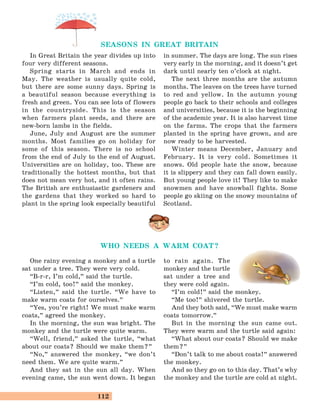
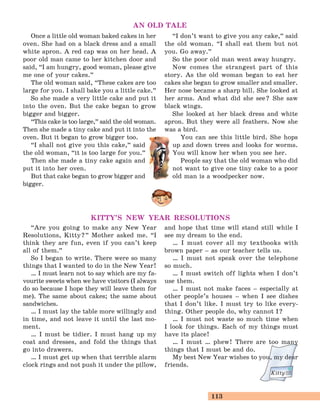
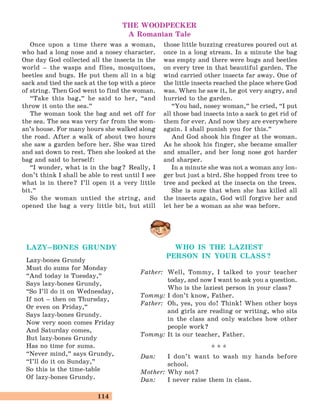
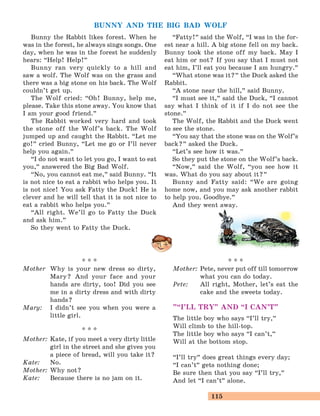
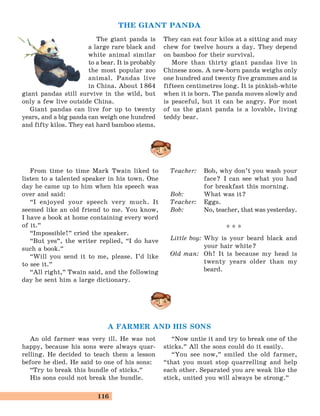
![117
Vocabulary
ache /’eik/ durere áîëü
aerobics /eB’rBMbPks/ aerobic= àэðîáèêà
(be)afraid of /B’frePd/ a se teme de áîÿòьñÿ
agency /’ePdGBnsP/ agenie áþðî
adventure /Bd’ventEB/ aventur= ïðèêëþ÷åíèå
airway /’eBweP/ rut= aerian= âîçäóøíàÿ òðàññà
alike /B’laPk/ asem=n=tor ïîõîæèé
alive /B’laPv/ viu, ]n via= æèâîé
almanac /’A:lmBnIk/ almanah àëüìàíàõ
almost /’A:lmBMst/ aproape, c]t pe ce ïî÷òè, ÷óòü íå
already /A:l’redP/ deja óæå
ancient /’ePnEBnt/ antic, str=vechi äðåâíèé
angel /’ePndGl/ ]nger àíãåë
anorak /’InBrIk/ hanorac âåòðîâêà
apartment /B’pa:tmBnt/ apartament êâàðòèðà
application /,IplP’kePEn/ cerere, solicitare çàÿâëåíèå
around /B’raMnd/ de jur ]mprejur êðóãîì
arrive /B’raPv/ a sosi, a veni прибывать
asleep /B’sli:p/ a adormi çàñíóòü
assembly hall /B’semblP ’hA:l/ sal= de festivit=i àêòîâûé çàë
athlete /’IJli:t/ atlet àòëåò
athletic /IJ’letPk/ atletic àòëåòè÷åñêèé
attic /’ItPk/ mansard= ìàíñàðäà
attentive /B’tentPv/ atent âíèìàòåëüíûé
attraction /B’trIkE(B)n/ atracie ïðèâëåêàòåëüíîñòü
attractive /B’trIktPv/ atr=g=tor ïðèâëåêàòåëüíûé
author /’A:JB/ autor автор
Aa
bacon /’bePkBn/ bacon, costi= áåêîí, êîï÷åíàÿ ãðóäèíêà
badge /bIdG/ insign= çíà÷îê
barbecue /’bL:bPkju:/ carne fript= la gr=tar çàæàðåíîå ìÿñî
barefoot /’beBfMt/ descul áîñèêîì
baseball /’bePsbA:l/ baseball áåéñáîë
bat /’bIt/ baston (la jocul de ar[ice) áèòà
beach /’bi:tE/ plaj= ïëяæ
beagle /’bi:gl/ copoi гончая
beauty /’bju:ti/ frumusee êðàñîòà
beef /bi:f/ carne de vit= ãîâÿäèíà
believe /bi’li:v/ a crede âåðèòü
beginning /bP’gPnPH/ ]nceput íà÷àëî
belong /bP’lOH/ a aparine ïðèíàäëåæàòü
besides /bP’sQdz/ ]n plus êроме того
best regards to... complimente привет
bite /baPt/ a mu[ca êóñàòü
blanket /’blIHkPt/ plapum= îäåяëî
blazer /’blePzB/ blazer ñïîðòèâíàÿ êóðòêà
blond /’blOnd/ blond, b=lai áåëîêóðûé
boast /bBMst/ a se l=uda õâàñòàòü(ñÿ)
boar /bA:/ porc mistre êàáàí
boating /’bBMtPH/ canotaj, plimbare cu barca ãðåáëÿ
body /’bOdi/ corp òåëî
boil /’bAPl/ a fierbe, a clocoti варить, êèïåòü
boiled /bAPld/ fiert вареный
booking office /’bMkPH OfPs/ cas= de bilete áèëåòíàÿ êàññà
bored /’bA:d/ plictisit ñêó÷àþùèé
boring /’bA:rPH/ plicticos ñêó÷íûé
Bb](https://image.slidesharecdn.com/vlimbaengleza-171205132953/85/Limba-engleza-Manual-pentru-cl-5-118-320.jpg)
![118
borrow /’bOrR/ a ]mprumuta брать на время
(be) born /’bA:n/ n=scut ðîæäåííûé
bother /’bOCB/ a plictisi, a nec=ji íàäîåäàòü
bowl /bBMl/ strachina миска, тарелка
break /brePk/ recreaie ïåðåìåíà
breathe /bri:C/ a respira äûøàòü
bright /braPt/ luminos, iste яркий, способный
broom /bru:m/ m=tur= ìåòëà
brush /brDE/ perie ùåòêà
bungalow /’bDHgBlBM/ c=su= îäíîýòàæíûé äîì
burn down /bF:n/ a arde ñгоретü
calf /’ka:f/ viel òåëåíîê
camping /’kImpiH/ camping êэìïèíã
candle /’kIndl/ lum]nare ñâå÷à
canned /kInd/ conservat консервированный
canteen /kIn’ti:n/ cantin= ñòîëîâàÿ
captain /’kIptin/ c=pitan капитан
cart /kL:t/ c=ru= òåëåãà, ïîâîçêà
cartoon /ka:’tu:n/ desen animat ìóëüòôèëüì
castle /ka:sl/ castel çμìîê
CD compact disk compact disc компакт-диск
(to take) a catnap /’kItnIp/ a aipi вздремнуть
certificate /sB’tPfPkBt/ certificat удостоверение
chat /tEIt/ conversaie разговор
cheek /tEi:k/ obraz ùåêà
chew /tEu:/ a mesteca æåâàòü
chewing gum /’tEu:iH gDm/ gum= de mestecat æåâàòåëüíàÿ ðåçèíêà
chicken /’tEPkPn/ pui, carne de pui öûïëеíîê
chop /tEOp/ a t=ia íàðåçàòü
Christ /krLPst/ Cristos Õðèñòîñ
citizen /’sPtPzn/ cet=ean, locuitor ãðàæäàíèí, æèòåëü
clear /klPB/ luminos погожий день
close /klBMs/ apropiat близкий
closet /’klOzPt/ c=mar=, magazie ÷óëàí
coal /’kRl/ c=rbune уголь
collection /kB’lekEn/ colecie êîëëåêöèÿ
college /’kOlPdG/ colegiu êîëëåдж
come out /,kDm ’aut/ a ie[i выходить
community /kB’mju:nBtP/ comunitate община
companion /kBm’pInPBn/ tovar=[ (de drum) òîâàðèù, ñïóòíèê
constitute /’kOnstPtju:t/ a forma, a alc=tui ñîñòàâëÿòü
contain /kBn’tePn/ a cuprinde ñîäåðæàòü
continent /’kOntPnBnt/ continent êîíòèíåíò
convenient /kBn’vi:niBnt/ convenabil óäîáíûé, ïîäõîäÿùèé
cooker /’kMkB/ plit= ïëèòà, ïå÷ü
copper /’kOpB/ cupru, aram= ìåäü
corn /kA:n/ porumb êóêóðóçà
cottage /’kOtPdG/ c=su=, vil= mic= äîìèê, äà÷à, êîòòåäæ
countryside /’kDntrisaPd/ ar=, provincie ñåëüñêàÿ ìåñòíîñòü
crop/krOp/ recolt= óðîæàé
curds /kF:dz/ br]nz= de vaci òâîðîã
curtain /kF:tn/ perdea занавеска
Cc
Dd
damp /dImp/ umed, jilav âëàæíûé
deaf /def/ surd ãëóõîé](https://image.slidesharecdn.com/vlimbaengleza-171205132953/85/Limba-engleza-Manual-pentru-cl-5-119-320.jpg)
![119
deer /dPB/ cerb îëåíü
delicious /dP’lPEBs/ delicios î÷åíü âêóñíûé
delight /dP’laPt/ pl=cere, bucurie óäîâîëüñòâèå
delightful /dP’laPtfMl/ ]nc]nt=tor î÷àðîâàòåëüíûé
dependence /dP’pendBns/ dependen= çàâèñèìîñòü
design /dP’zain/ a proiecta ïðîåêòèðîâàòü
detention /dP’tenEn/ reinere dup= lecii îñòàâëåíèå ïîñëå óðîêîâ
die /dai/ a muri óìåðåòü
dig /dPg/ a s=pa копать, рыть
dimple /dPmpl/ gropi= (]n obraz) ÿìî÷êà (íà ùåêå)
dining-car /’daPniH ka:/ vagon restaurant âàãîí-ðåñòîðàí
discover /dP’skDvB/ a descoperi, a dezv=lui îáíàðóæèòü, óçíàòü
dishwasher /’dPEwOEB/ ma[in= de sp=lat vesel= ïîñóäîìîå÷íàÿ ìàøèíà
distance /’dPstBns/ distan= ðàñсòîÿíèå
dressing /’dresiH/ sos ïðèïðàâà
dressmaker /’dresmNkB/ croitoreas= ïортниха
drink /driHk/ a bea ïèòü
drive /draPv/ a conduce un vehicul âодить ìàøèíó
drown /draMn/ a (se) ]neca òîíóòü
dry /draP/ uscat ñóõîé
duster /’dDstB/ c]rp= de [ters praful òðÿïêà для пыли
Ee
eggplant /’egplL:nt/ (p=tl=gea) v]n=t= áàêëàæàí
eldest /’eldPst/ cel mai ]n v]rst= ñòàðøèé
encyclopedia /Pn,saPklB’pi:diB/ enciclopedie ýíöèêëîïåäèÿ
endangered species /Pn’deindGBd ’spi:Ei:z/ specii ameninate вымирающие виды
endless /’endlBs/ nesf]r[it áåñêîíå÷íûé
enjoyable /Pn’dGAPBbl/ pl=cut ïðèÿòíûé
enough /P’nDf/ destul, de ajuns äîñòàòî÷íûé; достаточно
entertaining /,entB’tePnPH/ distractiv, amuzant ðàçâëåêàòåëüíûé
entry /’entrP/ articol de dicionar ñòàòüÿ â ñëîâàðå
equipment /P’kwPpmBnt/ echipament îáîðóäîâàíèå
escape /Ps’kNp/ a evada уходить
especially /P’speEBlP/ mai ales, ]n special îñîáåííî
eve /’i:v/ ajun сочельник, канун
event /P’vent/ ]nt]mplare, caz ñîáûòèå, ñëó÷àé
ever /’evB/ vreodat=, oric]nd êîãäà-íèáóäü, âñåãäà
everything /’evriJiH/ tot âñ¸
everywhere /’evriweB/ pretutindeni âåçäå, ïîâñþäó
except /Pk’sept/ ]n afar= de кроме
excited /Pk’saPtPd/ emoionat âçâîëíîâàíный
expensive /Pk’spensPv/ scump, costisitor äîðîãîé
expert /’ekspF:t/ specialist, expert çíàòîê, ñïåöèàëèñò
extra /’ekstrB/ suplimentar ÷òî-í. äîïîëíèòåëüíîå
Ff
fable /’fNbl/ fabul= басня
fact /fIkt/ fapt, ]nt]mplare ôàêò, ñîáûòèå
factory /fIkt(B)rP/ fabrica ôàбрика
fairy tale /’feBri tNl/ basm сказка
fall asleep /,fA:l B’sli:p/ a adormi засыпμть
famous /’fePmBs/ celebru знаменитый
fan /fIn/ evantai веер
fast /fL:st/ iute ñêîðûé, áûñòðûé
favourite /’fePvBrPt/ favorit, preferat ëþáèìûé
fawn /fA:n/ c=prior=, cerb t]n=r îëåíенок
feed /fi:d/ a hr=ni êîðìèòü](https://image.slidesharecdn.com/vlimbaengleza-171205132953/85/Limba-engleza-Manual-pentru-cl-5-120-320.jpg)
![120
gas /gIs/ gaz ãàç
gate /gePt/ poart= âîðîòà
general /’dGenBrBl/ comun общий
generous /’dGenBrBs/ generos âåëèêîäóøíûé
geography /dGP’OgrBfi/ geografie ãåîãðàôèÿ
get ripe /,get’raPp/ a se coace ñîçðåâàòü
get together /get tB’geCB/ a se aduna ñîáèðàòü(ñÿ)
ghost /gBMst/ duh, stafie ïðèçðàê, ïðèâèäåíèå
giant /’dGaPBnt/ gigant, uria[ âåëèêàí, ãèãàíò
gift /gPft/ dar ïîäàðîê
glass /gla:s/ sticl=, pahar ñòåêëî, стакан
glorious/’glA:rPBs/ glorios ñëàâíûé
gnaw /nA:/ a roade ãðûçòü
goat /gBMt/ capr= êîçà
golden /’gBMldn/ auriu çîëîòèñòûé
gooseberry /’gMzbBrP/ agri[= êðûæîâíèê
grasshoper /’gra:s,hOpB/ cosa[ êóçíå÷èê
grave /’grePv/ morm]nt ìîãèëà
greens /gri:nz/ legume proaspete, verdeuri çåëåíü, îâîùè
grow up /,grBu ’Dp/ a se face mare взрослеть, расти
growl /graMl/ a m]r]i ðû÷àòü
gun /gDn/ arm= de foc, pistol ïóøêà, ïèñòîëåò
gym /dGPm/ sal= de gimnastic= ãèìíàñòè÷åñêèé çàë
gymnastics /dGPm’nIstPks/ gimanstic= ãèìíàñòèêà
Gg
fence /fens/ gard çàáîð
ferry /’feri/ bac, ponton ïàðîì
fever /’fi:vB/ febr= òåìïåðàòóðà
fight /faPt/ a lupta äðàться
finally /’faPnBlP/ ]n sf]r[it, ]n ]ncheiere â çàêëþ÷åíèè
find out /faPnd’aMt/ a afla óçíàòü
fire /’faPB/ foc îãîíü
fireplace /’faPBplePs/ c=min, [emineu êàìèí, î÷àã
firework /’faPBwF:k/ foc de artificii фейерверк
fisherman /’fiEBmBn/ pescar ðûáàê
flat /’flIt/ plat, neted плоский, ровный
flight /’flQt/ zbor полет
floor /flA:/ etaj этаж
flower-bed /’flaMBbed/ strat, r=zor de flori êëóìáà
fly /flaP/ a zbura ëåòàòü
foal /fBMl/ m]nz æåðåáеíîê
foggy /’fOgP/ ceos, cu cea= òóìàííûé
fool /fu:l/ prost äóðàê, ãëóïåö
foreign /’fOrBn/ str=in èíîñòðàííûé
forgive /fB’gPv/ a ierta, a scuza ïðîñòèòü
fortress /’fA:trPs/ cetate êðåïîñòü
found /faMnd/ a funda, a ]ntemeia îñíîâûâàòü
freckle /frekl/ pistrui âåñíóøêà
friendship /’frendEPp/ prietenie äðóæáà
frying pan /’fraPPH,pIn/ tigaie ñêîâîðîäêà
fun /fDn/ distracie âåñåëüå, çàáàâà
(make) fun of smb a glumi pe seama cuiva íàñìåõàòüñÿ íàä
fur /fF:/ blan= ìåõ
habitat /’hIbP,tIt/ habitat естественная среда
ham /hIm/ jambon âåò÷èíà
hang /hIH/ a at]rna висеть
hand in /,hInd’Pn/ a ]nm]na âðó÷àòü
Hh](https://image.slidesharecdn.com/vlimbaengleza-171205132953/85/Limba-engleza-Manual-pentru-cl-5-121-320.jpg)
![121
hard /hL:d/ cu, din greu усердно
hard working /,hL:d’wF:kPH/ harnic, silitor òðóäîëþáèâûé
hare /heB/ iepure de c]mp çàÿö
harvest /’hL:vPst/ recolt= óðîæàé
hate /’hNt/ a ur] ненавидеть
hear /hiB/ a auzi ñëûøàòü
height /haPt/ ]n=lime âûñîòà
here /hPB/ aici, iat= здесь, тут
high /hLP/ ]nalt высокий
hold discussions /hBMld dP’skDE(B)nz/ a ine discuii проводить дискуссии
hole /hBMl/ gaur= äûðà, îòâåðñòèå
holly /’hOlP/ ilice остролист
home-made /,hBMm’mePd/ de cas= äîìàøíåãî èçãîòîâëåíèÿ
hoover /’hu:vB/ aspirator de praf пылесос
hoover /’hu:vB/ a cur=a cu aspiratorul пылесосить
horrible /’hOrBbl/ ]ngrozitor ñòðàøíûé
horse riding /’hA:s raPdPH/ c=l=rite âåðõîâàÿ åçäà
hospitable /’hOspitBbl/ ospitalier ãîñòåïðèèìíûé
household chores /’haMshBMld tEA:z/ treburi menajere работа по дому
however /hau’evB/ ([i) totu[i однако, тем не менее
hug /hDg/ a ]mbr=ti[a îáíèìàòü
huge /hju:dG/ imens, enorm îãðоìíûé, ãèãàíòñêèé
hunt /hDnt/ a v]na îõîòèòüñÿ
hurry /’hDrP/ grab= òîðîïëèâîñòü
in a hurry /in B ‘hDrP/ ]n (mare) grab= âòîðîïÿõ
hurt /hF:t/ a r=ni, a jigni ïðè÷èíèòü áîëü
imagine (v) /P’madGPn/ a imagina воображать
imagination (n) /P,mIdGP’nNEn/ imaginaie воображение
imaginative /P’mIdGPnBtPv/ imaginativ áîãàòûé âîîáðàæåíèåì
important /Pm’pA:tBnt/ important âàæíûé
impossible /Pm’pOsBbl/ imposibil íåâîçìîæíûé
individual /,PndP’vPdGuBl/ individual индивидуальный
indoor /’PndA:/ de sal= êîìíàòíûé
information /,PnfB’mePEn/ informaie èíôîðìàöèÿ, ñîîáùåíèå
ingredient /in’gri:dPBnt/ ingredient èíãðåäèåíò
instructor /Pn’strDktB/ instructor èíñòðóêòîð
interest /’PntrBst/ interes èíòåðåñ
international /,PntB’nIEnBl/ internaional ìåæäóíàðîäíûé
iron /’aPBn/ fier de c=lcat óòþã
Ii
jack-o-lantern /,dGIk B’lIntBn/ felinar scobit ]n bostan ôîíàðü èç òûêâû
jaw /dGA:/ bot ïàñòü
jolly /’dGOli/ vesel âåñеëûé
journalist /’dGF:nBlPst/ jurnalist, ziarist æóðíàëèñò
jumper /’dGDmpB/ pulover äæåìïåð
just /dGDst/ de cur]nd, numai ce òîëüêî ÷òî
keen /ki:n/ ascuit острый
keen on /,ki:n ‘On/ a se pasiona óâëåêàòüñÿ
keep /ki:p/ a ine, a p=stra äåðæàòü, õðàíèòü
kid /kPd/ ied êîçëеíîê
kitten /kPtn/ pisic êîòеíîê
knowledge /’nOlPdG/ cuno[tine çíàíèя
Jj
Kk](https://image.slidesharecdn.com/vlimbaengleza-171205132953/85/Limba-engleza-Manual-pentru-cl-5-122-320.jpg)
![122
ladder /’lIdB/ scar= ëåñтíèöà
lamb /lIm/ miel ÿãíеíîê
laugh at /la:f Bt/ a r]de de смеяться над
law /lA:/ lege закон
lawn /lA:n/ peluz=, gazon газон
lawyer /’lA:jB/ avocat àäâîêàò
lay the table /’lNCB’tNbl/ a pune masa накрывать на стол
leave (for) /li:v/ a pleca (la) уезжать
let’s go /’lets ’gBM/ s= mergem èäеì(òå)
librarian /lQ’brBrPBn/ bibliotecar библиотекарь
lilliput /’lPlPpDt/ pitic ëèëèïóò
literature /’lPtrBtEB/ literatur= ëèòåðàòóðà
lively /’laPvlP/ plin de via= îæèâëеííûé, весёлый
look after /,lMk ’a:ftB/ a avea grij= de смотреть за
look alike /’lMk B’laPk/ a se asem=na áûòü ïîõîæèì
lovable /’lDvBbl/ dr=gu ïðèâëåêàòåëüíûé, ìèëûé
lover /’lDvB/ amator ëþáèòåëü
low /lBM/ jos íèçêèé
luck /lDk/ noroc ñóäüáà, ñ÷àñòüå, óäà÷à
Ll
Mm
majestic /mB’dGestik/ maiestuos, m=re âåëè÷åñòâåííûé
married /’mIrPd/ c=s=torit æåíàòûé, çàìóæíÿÿ
master /’ma:stB/ st=p]n õîçÿèí
match /mItE/ meci ìàò÷
meal /mi:l/ mas=, m]ncare еда
means /mi:ns/ mijloace ñðåäñòâa
meat /mi:t/ carne ìÿñî
medieval /,medP’i:v(B)l/ medieval средневековый
melon /’melBn/ z=mos, pepene galben äûíÿ
memories /’memBrPz/ amintiri воспоминания
metropolitan /metrB’pOlPtBn/ mitropolit митрополит
midday /,mPd’deP/ amiaz= ïîëäåíü
midnight /’mPdnaPt/ miezul nopii ïîëíî÷ü
miner /’maPnB/ miner ãîðíÿê, øàõòеð
misbehave /,misbP’hePv/ a se purta r=u äóðíî âåñòè ñåáÿ
mix /mPks/ a amesteca смешивать
mixer /’mPksB/ aparat de mestecat, agitator ìèêñåð
modest /’mOdPst/ modest ñêðîìíûé
monarch /’mOnBk/ monarh ìîíàðõ
monastery /’mOnBstri/ m=n=stire ìîíàñòûðü
motorcycle /’mBMtBsaPkl/ motociclet= ìîòîöèêë
move /mu:v/ a se mi[ca äâèãàòüñÿ
movie /’mu:vi/ film кинофильм
mysterious /mP’stPBriBs/ misterios, tainic òàèíñòâåííûé
narrow /’nIrBM/ ]ngust óçêèé
nature /’nePtEB/ natur= ïðèðîäà
navigation /,nIvi’gePEn/ navigaie íàâèãàöèÿ
neighbour /’nePbB/ vecin ñîñåä
neither /’naPCB(r)/ nici..., nici... ни... ни...
Nn](https://image.slidesharecdn.com/vlimbaengleza-171205132953/85/Limba-engleza-Manual-pentru-cl-5-123-320.jpg)
![123
occupation /,Okju’pePEn/ ocupaie занятие
ocean /’BMEn/ ocean океан
office /’OfPs/ birou контора, канцелярия, офис
OK /R kN/ Perfect! }n regul=! Хорошо! Нормально!
once /wDns/ odat= однажды, когда-то
only /’BMnli/ singur единственный
opinion /B’pPniBn/ p=rere, opinie ìíåíèå
opposite /’OpBzPt/ vizavi íàïðîòèâ
orchard /’A:tEBd/ livad= ôðóêòîâûé ñàä
orchestra /’A:kPstrB/ orchestr= îðêåñòð
originally /B’rPdGBnBlP/ iniial ïåðâîíà÷àëüíо
outdoor /’aMtdA:/ ]n aer liber íà îòêðûòîì âîçäóõå
over /’BMvB/ peste, deasupra íàä, ñâåðõ
Oo
pail /pePl/ g=leat= âåäðî
pan /pIn/ crati= кастрюля
parade /pB’rePd/ parad= ïàðàä
parcel /pa:s(B)l/ pachet, colet пакет, посылка
PE /,pi:’i:/ educaie fizic= физическое воспитание
peaceful /’pi:sfl/ pa[nic ìèðíûé
peanut /’pi:nDt/ arahid= àðàõèñ
people /’pi:pl/ lume, oameni íàðîä, ëþäè
peel /pi:l/ a cur=a de coaj= снимать кожицу
pickled /’pPkld/ murat, marinat ñîëеíûé, ìàðèíîâàíûé
piece /pi:s/ bucat= êóñîê
piglet /’piglBt/ purcelu[ ïîðîñеíîê
pilot /’paPlBt/ pilot, aviator ïèëîò, летчик
pineapple /’paPnIpl/ ananas àíàíàñ
pinkish /’pPHkPE/ roz, trandafiriu ðîçîâàòûé
player /’plePB/ juc=tor èãðîê
playground /’plePgraMnd/ teren de jocuri ïëîùàäêà äëÿ èãð
point /pAPnt/ a indica óêàçûâàòü
polite /pB’laPt/ politicos âåæëèâûé
pond /pOnd/ hele[teu ïðóä
pool /pu:l/ balt= ëóæà
pour /pA:(r)/ a turna ëèòü
prefer /prP’fF:/ a prefera ïðåäïî÷èòàòü
press-up /’presDp/ flotare отжим
profile /’prBMfaPl/ profil, schi= biografic= áèîãðàôè÷åñêèé î÷åðê
progress /’prRgres/ progres ïðîãðåññ
programming /’prBMgrImPH/ programare ïðîãðàììирование
protect /prB’tekt/ a ap=ra, a proteja çàùèùàòü
prove /pru:v/ a dovedi, a verifica äîêàçûâàòü, óäîñòîâåðÿòü
proverb /’prOvB:b/ proverb пословица
Pp
new-born /’nju:bA:n/ nou-n=scut íîâîðîæäеííûé
next /nekst/ urm=torul ñëåäóþùèé
next to /’neksttB/ aproape de, l]ng= âîçëå
notice /’nBMtPs/ a observa çàìå÷àòü
nowadays /’naMBdePz/ ]n zilele noastre в наши дни
numerous /’nju:mBrBs/ numeros ìíîãî÷èñëåííûé](https://image.slidesharecdn.com/vlimbaengleza-171205132953/85/Limba-engleza-Manual-pentru-cl-5-124-320.jpg)
![124
(be) proud (of)/praMd/ a se m]ndri ãîðäèòüñÿ
puck /pDk/ puc øàéáà
purple /’pF:pl/ violet ôèîëåòîâûé
put on /,pMt ‘On/ a se ]mbr=ca îäåâàòüñÿ
put out /,pMt ‘aMt/ a scoate, a stinge âûêëàäàâàòü, тушить
radish /’rIdPE/ ridiche редиска
rapidly /’rIpidli/ rapid, abrupt áûñòðî, ñêîðî
rare /reB/ rar ðåäêèé
really /’ri:Bli/ ]ntr-adev=r äåéñòâèòåëüíî
recipe /’resBpi/ reet= ðåöåïò
recognize /’rekBg,nQz/ a recunoa[te признавать
record-book /’rekA:d bMk/ agenda elevului äíåâíèê
reference book /’referBns bMk/ carte de referine ñïðàâî÷íèê
register /’redGPstB/ registru æóðíàë
relative /’relBtPv/ rud= ðîäñòâåííèê
reliable /rP’laPBbl/ de ]ncredere íàäеæíûé
religious education educaie religioas= ðåëèãèîçíîå âîñïèòàíèå
/rP’lPdGBs ,edGu’kePEn/
remind /rP’mQnd/ a reaminti напоминать
report /ri’pA:t/ relatare, a relata ñîîáùåíèå, ñîîáùàòü
responsibility /ri,spOnsB’bPlPti/ responsabilitate îòâåòñòâåííîñòü
restore /ri’stA:/ a restaura âîññòàíàâëèâàòü
return ticket /rP’tF:n tPkPt/ bilet dus-]ntors îáðàòíûé áèëåò
reunion /ri:’ju:niBn/ reunire âîññîåäèíåíèå
revise /rP’vaPz/ a revizui, a corecta исправлять
revolting /rP’vBMltPH/ revolt=tor отвратительный
rhino /’raPnBM/ rinocer íîñîðîã
rich /rPtE/ bogat áîãàòûé
rise /raPz/ a r=s=ri, a se ridica ïîäíèìàòüñÿ
rock /rOk/ piatr=, st]nc= ñêàëà
rocking chair /’rOkPH tEeB/ balansoar êðåñëî-êà÷àëêà
roe /rBM/ c=prioar= êîñóëÿ
roll /rBMl/ chifl= áóëî÷êà
royal /’rAPBl/ regesc, regal êîðîëåâñêèé
rude /ru:d/ grosolan ãðóáûé
Rr
sack /sIk/ sac ìåøîê
sailboat /’sePlbBMt/ corabie cu p]nz= ïàðóñíàÿ ëîäêà
sailor /’sePlB/ marinar ìîðÿê, ìàòðîñ
sausage /’sOsPdG/ c]rna, salam êîëáàñà
save /seiv/ a salva ñïàñàòü
science /’saPBns/ [tiin= наука
Ss
quarrel /’kwOrBl/ ceart=, a se certa ññîðà, ññîðèòüñÿ
Qq](https://image.slidesharecdn.com/vlimbaengleza-171205132953/85/Limba-engleza-Manual-pentru-cl-5-125-320.jpg)
![125
secret /’si:krBt/ secret ñåêðåò, òàéíà
seldom /’seldBm/ rar редко
serious /’sPBrPBs/ serios серьезный
serve /’sF:v/ a servi подавать
shake (hands) /EePk/ a da m]na cu cineva ïîæàòü äðóã äðóãó ðóêи
share /EeB/ a ]mp=ri äåëèòü
shell (eggs) /Eel/ a cur=a ÷èñòèòü
shepherd /’EepBd/ p=stor, cioban ïàñòóõ
shine /EaPn/ a str=luci áëåñòåòü, ñèÿòü
shoot /Eu:t/ a trage cu arma, a ]mpu[ca ñòðåëяòü
shooting /Eu:tPH/ v]n=toare охота
shore /EA:/ =rm áåðåã
show smb. in (into) /,ER ’in/ a conduce (]n) проводить (в)
sign /saPn/ semn çíàê, ïðèçíàê
silly /’sPli/ prost ãëóïûé
similar (to) /’sPmBlB/ similar ïîõîæèé
single ticket /’siHgl/ bilet pentru o c=l=torie билет â îäèí êîíåö
sink /’sPHk/ chiuvet= ðàêîâèíà
sit up /,sPt’Dp/ a sta ]n capul oaselor ïðèïîäíÿòüñÿ
(be) situated /’sPtjuePtPd/ (a fi) situat (быть) ðàñïîëîæåííûм
skin /skin/ piele, coaj= кожа
slate /slePt/ t=bli=, placa de ardezie грифельная доска, шифер
sleeping bag /’sli:pPH bIg/ sac de dormit ñïàëüíûé ìåøîê
sleigh /sleP/ sanie сани
slowly /’slBMli/ ]ncet, lent ìåäëåííî
smart /smL:t/ de[tept, ingenios îñòðîóìíûé, íàõîä÷èâûé
smoke /smBMk/ fum дым
sociable /’sREBbl/ sociabil общительный
soft /sOft/ moale ìÿãêèé, íåæíûé
soul /sBMl/ suflet äóøà
space /spePs/ spaiu (cosmic) ïðîñòðàíñòâî, êîñìîñ
spaceship /’spePsEPp/ nav= cosmic= êîñìè÷åñêèé êîðàáëü
spacesuit /’spePssju:t/ scafandru ñêàôàíäð
special /’speEl/ special ñïåöèàëüíûé
spelling /’spelPH/ ortografie, liter= cu liter= ïðàâîïèñàíèå
splash /’splIE/ a stropi, strop брызгать, брызги
square /skweB/ scuar, pia= êâàäðàò, ïëîùàäü
stadium /’stePdiBm/ stadion ñòàäèîí
stage /stePdG/ scen= ñöåíà
stair /steB/ scar= ëåñòíèöà
standard /’stIndBd/ drapel, stindard çíàìÿ, øòàíäàðò
stem /stem/ tulpin= ñòâîë
step /step/ treapt= ñòóïåíüêà
stop by /stOp/ a trece pe la cineva çàãëÿíóòü к кому-либо
store /stA:/ a aduna запасать
straight /strePt/ drept, direct ïðÿìî
strange /strePndG/ ciudat, straniu ÷óæîé, странный
struggle /’strDgl/ lupt=; a se lupta áîðüáà; бороться
stuffed /stDft/ umplut фаршированный
stupid /’stju:pid/ stupid ãëóïûé
subject /’sDbdGPkt/ obiect de studiu предмет
supply /sB’plaP/ stok, a furniza çàïàñ, ñíàáæàòü
surprise /sB’praPz/ a surprinde, a ului óäèâëÿòü, ïîðàæàòü
survival /sB’vaPvl/ supravieuire âûæèâàíèå
survive /sB’vaPv/ a supravieui âûæèâàòü
swallow /’swOlBM/ a ]nghii глотать
swimming /’swimiH/ ]not ïëàâàíèе
swimming pool /’swimiH pu:l/ bazin de ]not áàññåéí äëÿ ïëàâàíèÿ](https://image.slidesharecdn.com/vlimbaengleza-171205132953/85/Limba-engleza-Manual-pentru-cl-5-126-320.jpg)
![126
take place /’tePk ‘plePs/ a avea loc ñëó÷àòüñÿ, èìåòü ìåñòî
talkative /’tA:kBtPv/ vorb=re ðàçãîâîð÷èâûé
team /ti:m/ echip= êîìàíäà
tease /ti:z/ a s]c]i ïðèñòàâàòü
tear /tPB/ lacrim= ñëåçà
technology /tek’nOlBdGi/ tehnologie òåõíèêà, òåõíîëîãèÿ
teddy bear /’tedi beB/ ursule (juc=rie) ìåäâåæоíîê (èãðóøêà)
terrific /tB’rPfPk/ extraordinar необычайный
terrible /’terBbl/ teribil страшный, ужасный
through /Jru:/ prin через
through train /’Jru: trein/ tren expres прямой, беспересадочный поезд
thump /JDmp/ a lovi tare колотить
ticket /’tPkPt/ bilet билет
tidy up /’taPdP Dp/ a face ordine прибирать
tie /taP/ a lega завязывать
timetable /’taPmtNbl/ orar расписание
title /taPtl/ titlu заглавие
(on) time /taPm/ la timp вовремя
toaster /’tBMstB/ toaster тостер
together /tB’geCB/ ]mpreun= вместе
top /tOp/ partea de sus верхняя часть
tourist /’tMBrPst/ turist турист
towards /tB’wA:dz/ spre, la к
traveller /’trIvBlB/ c=l=tor путешественник
travelling/’trIvBlPH/ c=l=torie путешествие
treat /’tri:t/ a trata лечить
trick /trPk/ pozn=, [iretlic шутка
trip /trPp/ c=l=torie поездка, экскурсия
true /tru:/ adev=rat, credincios преданный, верный
turkey /’tF:ki/ curcan индюк
turn off /’tF:n ‘Of/ a ]nchide закрыть, выключить
turn over /’tF:n ‘BMvB/ a (se) r=sturna переворачивать(ся)
twice /twaPs/ de dou= ori дважды
ugly /’Dgli/ ur]t безобразный
uniform /’ju:nifA:m/ uniform= форменная одежда
united /ju’naPtPd/ unit объединенный, дружный
until /Bn’tPl/ p]n= la до
upon /B’pOn/ pe на
useful /ju:sfl/ folositor полезный
valuable /’vIljuBbl/ valoros, preios ценный, дорогой
various /’veBrPBs/ divers, diferit разный, различный
vineyard /’vPnjBd/ vie, podgorie виноградник
vitamin /’vPtBmPn/ vitamin= витамин
volunteer /,vOlBn’tPB/ voluntar доброволец, волонтер
Uu
Vv
Tt](https://image.slidesharecdn.com/vlimbaengleza-171205132953/85/Limba-engleza-Manual-pentru-cl-5-127-320.jpg)
![127
wagon /’wIgBn/ c=ru= повозка
wait for /wePt/ a a[tepta ждать
waken /’wePkBn/ a se trezi пробуждаться, просыпаться
want /wOnt/ a dori хотеть
war /wA:/ r=zboi война
washing machine /’wOEPH mBEi:n/ ma[in= de sp=lat rufele стиральная машина
way /weP/ cale путь
on the way to /On CB’wN tB/ ]n drum spre по пути к
weigh /weP/ a c]nt=ri взвешивать
weight /wePt/ greutate тяжесть, вес
well-known /,wel’nBMn/ vestit популярный, известный
wet /wet/ ud мокрый
whitewash /’waPtwOE/ v=ruit; a v=rui побелка; белить
wife /waPf/ soie жена
wild /waPld/ s=lbatic дикий
wonderland /’wDndBlInd/ ara minunilor страна чудес
wood /wu:d/ lemn дерево (материал)
wooden /’wMdn/ de lemn деревянный
woods /wu:dz/ p=dure лес
woollen /’wu:lBn/ de l]n= шерстяной
Ww
Zz
zip /zPp/ fermoar застежка-молния](https://image.slidesharecdn.com/vlimbaengleza-171205132953/85/Limba-engleza-Manual-pentru-cl-5-128-320.jpg)
